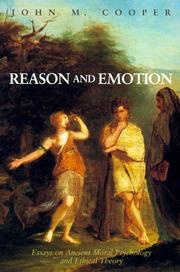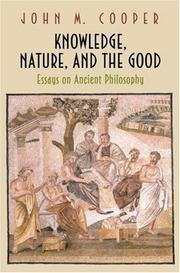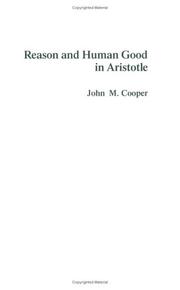| Listing 1 - 10 of 33 | << page >> |
Sort by
|

ISBN: 0691058741 069105875X 9780691058757 Year: 1999 Publisher: Princeton, N.J. Princeton University Press
Abstract | Keywords | Export | Availability | Bookmark
 Loading...
Loading...Choose an application
- Reference Manager
- EndNote
- RefWorks (Direct export to RefWorks)
This book brings together twenty-three distinctive and influential essays on ancient moral philosophy--including several published here for the first time--by the distinguished philosopher and classical scholar John Cooper. The volume gives a systematic account of many of the most important issues and texts in ancient moral psychology and ethical theory, providing a unified and illuminating way of reflecting on the fields as they developed from Socrates and Plato through Aristotle to Epicurus and the Stoic philosophers Chrysippus and Posidonius, and beyond. For the ancient philosophers, Cooper shows here, morality was "good character" and what that entailed: good judgment, sensitivity, openness, reflectiveness, and a secure and correct sense of who one was and how one stood in relation to others and the surrounding world. Ethical theory was about the best way to be rather than any principles for what to do in particular circumstances or in relation to recurrent temptations. Moral psychology was the study of the psychological conditions required for good character--the sorts of desires, the attitudes to self and others, the states of mind and feeling, the kinds of knowledge and insight. Together these papers illustrate brilliantly how, by studying the arguments of the Greek philosophers in their diverse theories about the best human life and its psychological underpinnings, we can expand our own moral understanding and imagination and enrich our own moral thought. The collection will be crucial reading for anyone interested in classical philosophy and what it can contribute to reflection on contemporary questions about ethics and human life.
Philosophical anthropology --- General ethics --- Antiquity --- Ethics, Ancient. --- Morale ancienne --- Plato --- Aristotle --- Ethics. --- 1 <38> --- 17 --- Ethics, Ancient --- Ancient ethics --- Griekse filosofie --- Filosofische ethiek --- -Aristoteles --- Aflāṭūn --- Aplaton --- Bolatu --- Platon, --- Platonas --- Platone --- Po-la-tʻu --- Pʻŭllatʻo --- Pʻŭllatʻon --- Pʻuratʻon --- Πλάτων --- אפלטון --- פלאטא --- פלאטאן --- פלאטו --- أفلاطون --- 柏拉圖 --- 플라톤 --- Ethics --- 17 Filosofische ethiek --- 1 <38> Griekse filosofie --- Aristoteles --- Aristote --- Aristotile --- Platon --- Platoon --- Arisṭāṭṭil --- Aristo, --- Aristotel --- Aristotele --- Aristóteles, --- Aristòtil --- Arisṭū --- Arisṭūṭālīs --- Arisutoteresu --- Arystoteles --- Ya-li-shih-to-te --- Ya-li-ssu-to-te --- Yalishiduode --- Yalisiduode --- Ἀριστοτέλης --- Αριστοτέλης --- Аристотел --- ארסטו --- אריםטו --- אריסטו --- אריסטוטלס --- אריסטוטלוס --- אריסטוטליס --- أرسطاطاليس --- أرسططاليس --- أرسطو --- أرسطوطالس --- أرسطوطاليس --- ابن رشد --- اريسطو --- Pseudo Aristotele --- Pseudo-Aristotle --- Платон --- プラトン --- アリストテレス --- 17 Moral philosophy. Ethics. Practical philosophy --- Moral philosophy. Ethics. Practical philosophy --- Antiochus. --- Athenaeus. --- Bruns, Ivo. --- Burkert, W. --- Chrysippus. --- Cicero. --- Diotima. --- Epictetus. --- Isocrates. --- Kelsey, Sean. --- Lucretius. --- Marcus Aurelius. --- Mitsis, Phillip. --- Olympiodorus. --- Penner, T. --- Plotinus. --- Posidonius. --- Priam. --- Strauss, L. --- akrasia. --- altruism. --- animals. --- co-instantiation. --- courage. --- death. --- dialectic. --- educators. --- empiricism. --- ethics. --- eudaimonism. --- flourishing. --- goods, external. --- hedonism. --- imagination. --- incontinence. --- interentailment of virtues. --- justice. --- knowledge. --- language. --- moral psychology. --- motivations, human. --- music. --- nature. --- nonrational desires. --- objectivity. --- oratory. --- perfection. --- phantasiai. --- piety. --- rhetoric. --- self-awareness. --- suicide.

ISBN: 0691117241 0691117233 9786612087080 1282087088 1400826446 9781400826445 9780691117232 9780691117249 Year: 2004 Publisher: Princeton (N.J.) Princeton university press
Abstract | Keywords | Export | Availability | Bookmark
 Loading...
Loading...Choose an application
- Reference Manager
- EndNote
- RefWorks (Direct export to RefWorks)
Knowledge, Nature, and the Good brings together some of John Cooper's most important works on ancient philosophy. In thirteen chapters that represent an ideal companion to the author's influential Reason and Emotion, Cooper addresses a wide range of topics and periods--from Hippocratic medical theory and Plato's epistemology and moral philosophy, to Aristotle's physics and metaphysics, academic scepticism, and the cosmology, moral psychology, and ethical theory of the ancient Stoics. Almost half of the pieces appear here for the first time or are presented in newly expanded, extensively revised versions. Many stand at the cutting edge of research into ancient ethics and moral psychology. Other chapters, dating from as far back as 1970, are classics of philosophical scholarship on antiquity that continue to play a prominent role in current teaching and scholarship in the field. All of the chapters are distinctive for the way that, whatever the particular topic being pursued, they attempt to understand the ancient philosophers' views in philosophical terms drawn from the ancient philosophical tradition itself (rather than from contemporary philosophy). Through engaging creatively and philosophically with the ancient texts, these essays aim to make ancient philosophical perspectives freshly available to contemporary philosophers and philosophy students, in all their fascinating inventiveness, originality, and deep philosophical merit. This book will be treasured by philosophers, classicists, students of philosophy and classics, those in other disciplines with an interest in ancient philosophy, and anyone who seeks to understand philosophy in philosophical terms.
Ancient philosophy --- Antieke filosofie --- Filosofie [Antieke ] --- Filosofie [Griekse ] --- Filosofie [Romeinse ] --- Filosofie van de Oudheid --- Greek philosophy --- Griekse filosofie --- Philosophie ancienne --- Philosophie antique --- Philosophie de l'Antiquité --- Philosophie grecque --- Philosophie romaine --- Philosophy [Ancient ] --- Philosophy [Greek ] --- Philosophy [Roman ] --- Roman philosophy --- Romeinse filosofie --- Philosophy, Ancient. --- Knowledge, Theory of --- Naturalism --- Good and evil --- Théorie de la connaissance --- Naturalisme --- Bien et mal --- #GGSB: Filosofie --- #GGSB: Filosofie (oudheid) --- Théorie de la connaissance --- Philosophy, Greek --- Philosophy, Roman --- Philosophy, Ancient --- Filosofie --- Filosofie (oudheid) --- Academic skepticism. --- Alexander Nehamas. --- Alexander of Aphrodisias. --- Analogy. --- Antiochus of Ascalon. --- Aristotle. --- Arius Didymus. --- Atomism. --- Awareness. --- Cambridge University Press. --- Carneades. --- Chrysippus. --- Concept. --- Counterargument. --- Criticism. --- Democritus. --- Determinism. --- Dialectician. --- Disease. --- Empedocles. --- Epictetus. --- Epicureanism. --- Epicurus. --- Epistemology. --- Ethics. --- Eudaimonia. --- Existence. --- Explanation. --- Explication. --- Eye color. --- Feeling. --- First principle. --- Four causes. --- Glaucon. --- God. --- Good and evil. --- Hedonism. --- Hiero (Xenophon). --- Hypothesis. --- Illustration. --- Immanuel Kant. --- Indication (medicine). --- Inference. --- Ingredient. --- Inquiry. --- Isocrates. --- Lecture. --- Loeb Classical Library. --- Materialism. --- Methodology. --- Morality. --- Mutatis mutandis. --- Natural kind. --- On Ancient Medicine. --- Ontology. --- Parmenides. --- Phenomenon. --- Philosopher. --- Philosophical analysis. --- Philosophical methodology. --- Philosophical theory. --- Philosophy. --- Physician. --- Plato. --- Platonism. --- Potentiality and actuality. --- Practical reason. --- Pre-Socratic philosophy. --- Premise. --- Principle. --- Protagoras. --- Pyrrhonism. --- Quantity. --- Rationality. --- Reality. --- Reason. --- Requirement. --- Rhetoric. --- Self-sufficiency. --- Semen. --- Sextus Empiricus. --- Skepticism. --- Socratic method. --- Socratic. --- Stoicism. --- Suggestion. --- Teleology. --- The Philosopher. --- Theaetetus (dialogue). --- Theoretical physics. --- Theory of Forms. --- Theory. --- Thought. --- Treatise. --- Uncertainty. --- Understanding. --- Value theory. --- Virtue. --- W. D. Ross. --- Writing.
Book
ISBN: 0674749529 9780674749528 Year: 1977 Publisher: Cambridge, Mass. Harvard University Press
Abstract | Keywords | Export | Availability | Bookmark
 Loading...
Loading...Choose an application
- Reference Manager
- EndNote
- RefWorks (Direct export to RefWorks)
Ethics, Ancient --- Reason --- Aristotle --- -Mind --- Intellect --- Rationalism --- Ancient ethics --- History --- Aristoteles --- Contributions in ethics. --- Ethics, Ancient. --- Reason. --- Aristotle. --- -History --- Aristote --- Aristotile --- -Ancient ethics --- Mind --- General ethics --- Aristoteles. --- Arisṭāṭṭil --- Aristo, --- Aristotel --- Aristotele --- Aristóteles, --- Aristòtil --- Arisṭū --- Arisṭūṭālīs --- Arisutoteresu --- Arystoteles --- Ya-li-shih-to-te --- Ya-li-ssu-to-te --- Yalishiduode --- Yalisiduode --- Ἀριστοτέλης --- Αριστοτέλης --- Аристотел --- ארסטו --- אריםטו --- אריסטו --- אריסטוטלס --- אריסטוטלוס --- אריסטוטליס --- أرسطاطاليس --- أرسططاليس --- أرسطو --- أرسطوطالس --- أرسطوطاليس --- ابن رشد --- اريسطو --- Pseudo Aristotele --- Pseudo-Aristotle --- アリストテレス
Book
ISBN: 9780691138602 0691138605 069115970X 9780691159706 Year: 2012 Publisher: Princeton (N.J.) Princeton university press
Abstract | Keywords | Export | Availability | Bookmark
 Loading...
Loading...Choose an application
- Reference Manager
- EndNote
- RefWorks (Direct export to RefWorks)
This is a major reinterpretation of ancient philosophy that recovers the long Greek and Roman tradition of philosophy as a complete way of life--and not simply an intellectual discipline. --from publisher description.
Socrates. --- Plotinus --- Conduct of life. --- Lebensführung. --- Philosophie. --- Philosophy, Ancient. --- Weisheit. --- Wisdom. --- Griechenland. --- Conduct of life --- Philosophy, Ancient --- Wisdom --- Experience --- Intellect --- Learning and scholarship --- Reason --- Ancient philosophy --- Greek philosophy --- Philosophy, Greek --- Philosophy, Roman --- Roman philosophy --- Ethics, Practical --- Morals --- Personal conduct --- Ethics --- Philosophical counseling
Book
ISBN: 1280494050 9786613589286 1400842328 9781400842322 9780691138602 0691138605 9780691159706 069115970X Year: 2012 Publisher: Princeton, NJ
Abstract | Keywords | Export | Availability | Bookmark
 Loading...
Loading...Choose an application
- Reference Manager
- EndNote
- RefWorks (Direct export to RefWorks)
This is a major reinterpretation of ancient philosophy that recovers the long Greek and Roman tradition of philosophy as a complete way of life--and not simply an intellectual discipline. Distinguished philosopher John Cooper traces how, for many ancient thinkers, philosophy was not just to be studied or even used to solve particular practical problems. Rather, philosophy--not just ethics but even logic and physical theory--was literally to be lived. Yet there was great disagreement about how to live philosophically: philosophy was not one but many, mutually opposed, ways of life. Examining this tradition from its establishment by Socrates in the fifth century BCE through Plotinus in the third century CE and the eclipse of pagan philosophy by Christianity, Pursuits of Wisdom examines six central philosophies of living--Socratic, Aristotelian, Stoic, Epicurean, Skeptic, and the Platonist life of late antiquity. The book describes the shared assumptions that allowed these thinkers to conceive of their philosophies as ways of life, as well as the distinctive ideas that led them to widely different conclusions about the best human life. Clearing up many common misperceptions and simplifications, Cooper explains in detail the Socratic devotion to philosophical discussion about human nature, human life, and human good; the Aristotelian focus on the true place of humans within the total system of the natural world; the Stoic commitment to dutifully accepting Zeus's plans; the Epicurean pursuit of pleasure through tranquil activities that exercise perception, thought, and feeling; the Skeptical eschewal of all critical reasoning in forming their beliefs; and, finally, the late Platonist emphasis on spiritual concerns and the eternal realm of Being. Pursuits of Wisdom is essential reading for anyone interested in understanding what the great philosophers of antiquity thought was the true purpose of philosophy--and of life.
Conduct of life. --- Wisdom. --- Philosophy, Ancient. --- Ethics, Practical --- Morals --- Personal conduct --- Ethics --- Philosophical counseling --- Experience --- Intellect --- Learning and scholarship --- Reason --- Ancient philosophy --- Greek philosophy --- Philosophy, Greek --- Philosophy, Roman --- Roman philosophy --- Aristotelian life. --- Aristotle. --- Epicurean life. --- Epicurus. --- Hadot. --- Plato. --- Platonism. --- Platonist life. --- Plotinus. --- Pyrrhonian skepticism. --- Sextus Empiricus. --- Skeptic life. --- Socrates. --- Socratic knowledge. --- Socratic life. --- Stoic life. --- Stoicism. --- Stoics. --- ancient philosophy. --- biology. --- contemplative life. --- dialectic. --- ethics. --- happiness. --- human life. --- logic knowledge. --- logic. --- metaphysics. --- moral philosophy. --- physical theory. --- skeptics. --- virtues. --- wisdom.
Book
Year: 1917 Publisher: Washington USGPO
Abstract | Keywords | Export | Availability | Bookmark
 Loading...
Loading...Choose an application
- Reference Manager
- EndNote
- RefWorks (Direct export to RefWorks)

ISBN: 9780872200227 9780872201156 0872200221 0872201155 Year: 1986 Publisher: Indianapolis : Hackett Pub. Co ,
Abstract | Keywords | Export | Availability | Bookmark
 Loading...
Loading...Choose an application
- Reference Manager
- EndNote
- RefWorks (Direct export to RefWorks)
Reason --- Ethics, Ancient --- Raison --- Morale ancienne --- History --- Histoire --- Aristotle --- Ethics.
Book
Year: 1924 Publisher: Washington (D.C.): Catholic education press
Abstract | Keywords | Export | Availability | Bookmark
 Loading...
Loading...Choose an application
- Reference Manager
- EndNote
- RefWorks (Direct export to RefWorks)
Book
Year: 1971 Publisher: Chicago Athletic institute
Abstract | Keywords | Export | Availability | Bookmark
 Loading...
Loading...Choose an application
- Reference Manager
- EndNote
- RefWorks (Direct export to RefWorks)
Book
Year: 1928 Publisher: Washington (D.C.): Catholic education press
Abstract | Keywords | Export | Availability | Bookmark
 Loading...
Loading...Choose an application
- Reference Manager
- EndNote
- RefWorks (Direct export to RefWorks)
| Listing 1 - 10 of 33 | << page >> |
Sort by
|

 Search
Search Feedback
Feedback About UniCat
About UniCat  Help
Help News
News